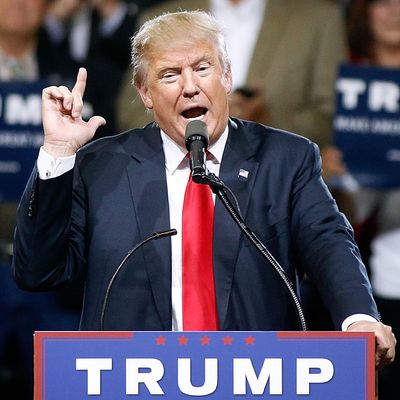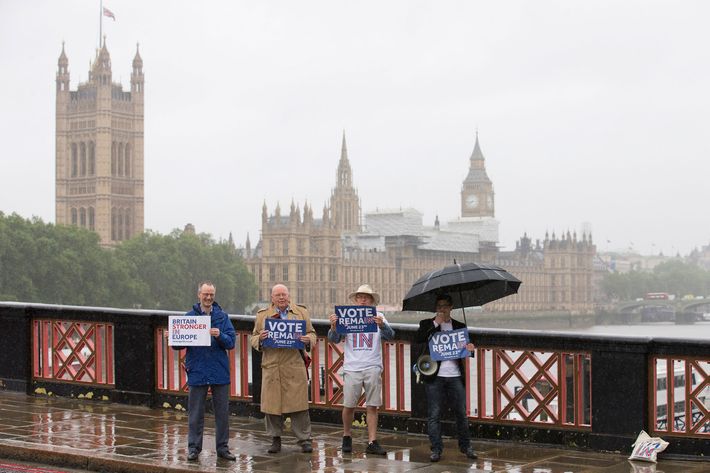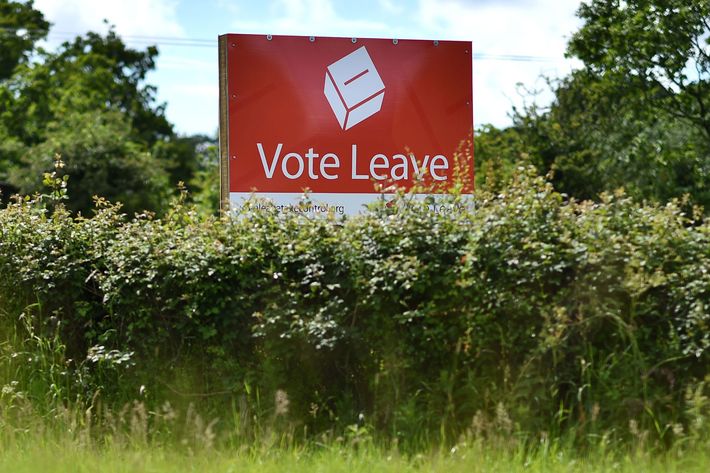
This week, the people of the United Kingdom might choose, for no obvious reason, to inflict grievous harm on their own economy. On Thursday, voters in England, Wales, Northern Ireland, and Scotland will head to the polls for a referendum on whether to stay in or leave the European Union, the group of nations with which the U.K. does a plurality of its trade. If the so-called Bremain side wins, nothing changes — Britain remains in the EU, and those trade relationships will be undisturbed. But if the Brexit camp wins and the U.K. says so long to Europe’s economic community, economists expect a lot of unpleasantness to ensue, beginning with significant short-term financial dislocations (read, markets tanking) and in decades ahead making the average Briton significantly poorer — thousands of dollars per year in lost income — than she would otherwise be. As of Monday evening, the markets give Brexit something like a 40 percent chance of happening.
Why would the British choose to do something so obviously against their own self-interest? Why would they voluntarily take money out of their own pockets? What’s the matter with East Anglia? Those are not easy questions to answer, but the rise of Donald Trump here does help to explain what is going on across the pond.

If voters decide to leave on June 23, the United Kingdom would secede from the 28-member European Union and would then be stuck trying to figure out what kind of new ties it wants with Europe and the world. This would be complicated, to say the least — and there are no great options. It could go it alone, setting up new trade and immigration deals nation by nation — but it would do so with market clout equivalent to about 4 percent of world GDP, versus the European Union’s one-quarter. Or it could try to go the way of Norway, maintaining free trade and open borders with the bloc, abiding by a bunch of European regulations, while losing its influence in Brussels. But since the EU’s regulations are a major reason why many Britons are dissatisfied with the relationship, it’s difficult to imagine that route.
It is worth acknowledging that the European Union is a mess of an international institution, and it makes some sense that Britain would not be euphoric about being part of it right now. Consider the EU’s tragically inept response to the global financial crisis, its equally cruel mismanagement of the refugee crisis, its corporatism, its many lesser sins. The leave campaign has surfaced a number of very good arguments about the ways it weighs on Britain, and prompted a lot of important discussion about the ways London might change its relationship with Brussels.
Even given all that, the business community is strongly against leaving. The CBI — a kind of British Business Roundtable — polled its members recently. A significant majority said that “exit would damage their access to E.U. markets,” “the U.K.’s ability to influence policies that affect their business would diminish,” “foreign direct investment would fall,” “the U.K.’s ability to participate in E.U. supply chains would decline,” and that “the U.K.’s international competitiveness would decline.”
Economists agree with the business leaders. There are plenty of analyses — from investment banks, the International Monetary Fund, and the British government — out there estimating the effects of Brexit, and they generally come to the same conclusion. The Organization for Economic Cooperation and Development, to choose one, expects it would be a negative shock to the British economy, reducing per-household income by about $3,100 by 2020 and $4,500 by 2030. Output would be 5 percent smaller than it would be otherwise in that latter year. In the most pessimistic scenario modeled by researchers for the London School of Economics, output would ultimately take a 9.5 percent hit, “a loss of a similar size to that resulting from the global financial crisis of 2008-09.”

There are a few economists for Brexit, and many who think that leaving might not be that bad, depending on how the United Kingdom sets up its relationships with the world afterward. But, by and large, the profession is remarkably united in supporting Bremain. In a recent survey, just 11 percent of British economists disputed the notion that “there would be substantial negative long-term consequences for the U.K. financial sector if the U.K. were to leave the E.U.,” and zero percent — zero percent! — said they believed that the broader economic effect would be positive.
Yet, in one recent poll of people who say they will definitely vote, the leaves have it, 49 percent to 48 percent. And among leave voters, 44 percent say that Brexit would have no effect on British jobs, and 45 percent say the effect would be good; only 3 percent of leave voters believe that the economy would actually weaken outside the European Union. With that last figure in mind, it’s fair to question whether the average Brexit supporter is grounded in reality. It would be one thing to make a clear-eyed choice, accepting an economic hit based on a devotion to some larger political principle. But most pro-Brexit voters seem to live in a fantasy where bouncing from the EU will help the economy. That’s troubling. This mass separation from reality also represents a parallel to what is going on with our strange, sad election in the United States.
Both Donald Trump and Brexit have bubbled up during periods of slow-but-steady growth, high inequality, and wage stagnation — economic conditions that rankle voters but do not obsess them. In the United States, for the first time in a very long time, economic strife is not what is driving the polls. When you ask Americans what the most important problem facing the country is, economic concerns are still the most cited. Even so, a majority of respondents name something else — crime, drugs, guns, how the government is run — as the most important issue. Similarly, the economy is no longer Britons’ main concern. Right now, when asked what the most important issue facing the country is, they cite immigration, the National Health Service, and their relationship with Europe. The economy comes in fourth.
In both cases, that seems to have left space for other concerns to override simple economic ones. (It seems to me there is a reason neither Brexit nor Trump really took hold in 2008 or 2010. You don’t try alternative medicines when you know you need surgery.) And in both cases, a sense of crisis around immigration, a deep sense of nationalism, and a distaste for elites and technocrats has taken hold.
Let’s start with immigration. Among Republicans, Trump has tapped into a deep vein of anti-immigrant, pro-nativist sentiment, promising to seal the country’s borders and threatening to deport millions of people. Here’s one finding from Pew that suggests how his beliefs have translated into votes: “Among the vast majority of GOP voters who think that the growing number of newcomers to the U.S.‘threatens traditional American customs and values,’$2 59 percent have warm feelings toward Donald Trump – with 42 percent saying they feel very warmly toward him.”
Similarly, those voting for Brexit tend to worry about immigration making England less English, and about immigrants taking Britons’ jobs. “Citizens of regions where immigration is perceived as damaging are much more likely to vote for Brexit,” one study found. (I’ll note here that it is not obvious that leaving the European Union would do anything to tamp down on immigration, and that immigrants from the European Economic Area are a boon to the United Kingdom’s economy.)
Immigration is certainly fair game for a policy debate, but beyond the legitimate questions there’s a dark underbelly to the anti-immigrant sentiment driving both the Donald’s astonishing rise in the United States and Brexit’s surprising success. Trump is openly xenophobic and racist, intentionally riling up his supporters in the worst ways and encouraging them to embrace and express their own bigotries. That’s a dangerous road for any nation to start down. Some leaders of Brexit are openly xenophobic and racist and are using the same tactics. It makes fair-minded observers wonder what the real point is here: modest changes in immigration policy, or the rejection of the values that allow for a pluralistic society?
Then there is the issue of antipathy toward elites. Trump is a rich and connected New Yorker, a Wharton grad, and the coddled inheritor of a real-estate fortune, sure. Nevertheless, with his middle finger raised to the Republican Establishment and to common standards of propriety, he has ridden a wave of distaste for the more buttoned-up masters of the universe. His voters are unusually likely to agree with statements like “It doesn’t really matter who you vote for because the rich control both political parties,” “Politics usually boils down to a struggle between the people and the powerful,” and “The system is stacked against people like me.”
Similarly, the leave campaign has painted the remain campaign as urbane, out of touch, and beholden to a bunch of inept pencil pushers in Brussels, and has argued against trusting experts, elites, the powerful. “People in this country have had enough of experts,” said Michael Gove, the justice secretary and a leader of the leave movement, while appearing on Sky News. Leave voters are unusually likely to agree with statements like “To me, there isn’t much difference between the major political parties in Britain,” “They are out of touch, and they don’t fight for people like me,” and “Britain’s political parties, political institutions, and corporate powers are totally out of touch.”

Now, they might have a point on some of that. But in both cases, this anti-elite sentiment seems to have morphed into a blithe anti-empiricism. (Numbers are only for technocrats these days, it seems.) The leave campaign’s headline economic argument is that the United Kingdom “sends” 350 million pounds, or half a billion dollars, a week to the European Union. This figure has been repeatedly and exhaustively debunked, yet it persists. Similarly — well, not entirely similarly — Trump’s policy proposals are the most banana-pants, math-challenged economic fantasy imaginable: He promises to pay off the national debt while also cutting taxes, insists a crippling trade war would help the economy, and so on. His supporters seem not to care. Be wary of political causes that are unfazed by facts that would seem to undercut their core assertions.
Finally, the supporters of both Brexit and our presumptive GOP nominee feel a yen for national self-reliance. Many Britons are concerned that London has ceded too much sovereignty to Brussels, and believe that British laws should be made in Parliament. “This is a once-in-a-lifetime chance for us to take back control of this country,” said Boris Johnson, the former mayor of London and current member of Parliament, campaigning for Brexit. The nationalist yen is more cancerous here. “We’re going to take our country back,” said Trump, campaigning for the presidency, making promises about global domination rather than a global partnership. But there’s a reason that nations have, at the margins, ceded slivers of control to participate in larger economic and political alliances. Namely because they work, as measured by making us safer and more prosperous.
None of these arguments are likely to convince a well-informed voter that either Brexit or electing Trump would be good for them in an economic sense. But in the case of Brexit (and the GOP base), they seem to be winning out. What’s the matter with East Anglia is that voters seem to be willing to trade away something real — their economic well-being — for things that are notional and even unrealistic: a more visceral desire to make England England again, to chasten the elites who brought on all this malaise, and to keep foreigners out.
The Donald, for what it is worth, is on Team Leave. “Huh?” he said when The Hollywood Reporter asked him about it recently. The journalist interviewing him proceeded to explain what Brexit was to the candidate, who apparently was not familiar with it.
“Oh yeah, I think they should leave,” Trump replied.





























